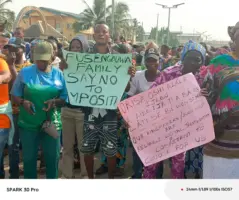The Lagos State Government has inaugurated a 24-hour traffic management and enforcement system across the state while reclaiming key transport corridors in Apapa, Coastain, and Ijora from illegal occupation and environmental infractions.
The initiatives, launched by the Lagos State Traffic Management Authority (LASTMA), mark a major step in the state’s effort to improve mobility, enhance safety, and restore order on its roads.
This was contained in a statement by the Director, Public Affairs and Enlightenment Department, LASTMA, Adebayo Taofiq, on Friday, October 24.
Speaking during the official inauguration on Friday, the Special Adviser to the Governor on Transportation, Hon. Sola Giwa, said the round-the-clock traffic operation underscores Governor Babajide Sanwo-Olu’s commitment to ensuring smooth movement of people and goods within the state.
“This initiative exemplifies the Lagos State Government’s resolute commitment to safeguarding mobility, preserving lives, and sustaining economic productivity through perpetual traffic oversight,” Hon. Giwa stated.
He explained that the new operational framework would enable continuous traffic monitoring, prompt emergency response, and swift clearance of obstructions at any time of the day.
As part of the initiative, a Night Rapid Response Gang has been established within LASTMA to handle nighttime traffic incidents such as vehicle breakdowns, collisions, and other emergencies on major routes.
Read Also
In addition to the new traffic management regime, the state government carried out a large-scale clearance operation along Apapa Road, Coastain, and Ijora Under Bridge, removing illegal structures, shanties, and makeshift markets that had obstructed vehicular movement and threatened public safety.
The enforcement exercise was jointly carried out by LASTMA, the Nigeria Police Force, Mobile Police (MOPOL), the Lagos State Task Force, and the Lagos State Environmental Sanitation Corps (LAGESC).
READ ALSO: Police Presents N24.1m To Families Of Late Officers In Lagos
During the operation, authorities uncovered an illegal diesel dumping site and seized quantities of expired plantain chips and cheese balls found stored under unhygienic conditions. Officials also cleared blocked drainage channels filled with metallic debris that had contributed to flooding in the area.
Several commercial buses and tricycles operating illegally along the newly constructed Coastain Bridge and Apapa Road were impounded, while shanties near St. Catholic Church School, Apapa Road, were demolished to restore the area for urban and educational use. Criminal hideouts under the Ijora Bridge were also dismantled.
Hon. Giwa emphasized that the Sanwo-Olu administration remains committed to enforcing urban order, environmental protection, and public safety.
“Lagos must remain a city distinguished by structure, order, and discipline,” he said.
The General Manager of LASTMA, Mr. Olalekan Bakare-Oki, urged traders, transport operators, and commuters to adhere to government directives, use designated markets and parking areas, and cooperate with authorities to sustain traffic flow and environmental cleanliness.
He noted that the combination of 24-hour traffic operations and environmental enforcement represents the government’s holistic approach to sustainable urban mobility—“a strategy that integrates innovation, proactive enforcement, and civic responsibility.”





